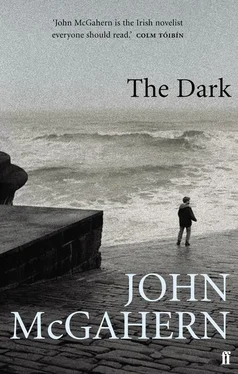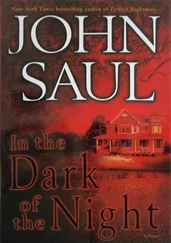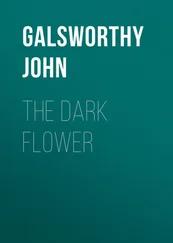John McGahern - The Dark
Здесь есть возможность читать онлайн «John McGahern - The Dark» весь текст электронной книги совершенно бесплатно (целиком полную версию без сокращений). В некоторых случаях можно слушать аудио, скачать через торрент в формате fb2 и присутствует краткое содержание. Год выпуска: 2002, Издательство: Penguin Books, Жанр: Современная проза, на английском языке. Описание произведения, (предисловие) а так же отзывы посетителей доступны на портале библиотеки ЛибКат.
- Название:The Dark
- Автор:
- Издательство:Penguin Books
- Жанр:
- Год:2002
- ISBN:нет данных
- Рейтинг книги:5 / 5. Голосов: 1
-
Избранное:Добавить в избранное
- Отзывы:
-
Ваша оценка:
- 100
- 1
- 2
- 3
- 4
- 5
The Dark: краткое содержание, описание и аннотация
Предлагаем к чтению аннотацию, описание, краткое содержание или предисловие (зависит от того, что написал сам автор книги «The Dark»). Если вы не нашли необходимую информацию о книге — напишите в комментариях, мы постараемся отыскать её.
The Dark — читать онлайн бесплатно полную книгу (весь текст) целиком
Ниже представлен текст книги, разбитый по страницам. Система сохранения места последней прочитанной страницы, позволяет с удобством читать онлайн бесплатно книгу «The Dark», без необходимости каждый раз заново искать на чём Вы остановились. Поставьте закладку, и сможете в любой момент перейти на страницу, на которой закончили чтение.
Интервал:
Закладка:
Knockvicar Locks was as far as the boat could get up the river, because of the great wooden gates. To an ash sapling rooted in the stones we tied the boat and started to worm fish for perch, an even mane of water falling across the wall and churning white out on the stones from the sluice, the smell of rotting river-weed thick in the air.
The place was almost crowded: a few boats, people sitting on the lock gates or out on the wall fishing with their trousers rolled to their knees, the mane of water dragging at their ankles before it poured down the green wall; girls on the grass along the bank. There was sense of laziness and ease and Sunday over it all, but the fishing was without pleasure, list¬ lessly pulling in the small perch, their bright red fins and the gills working on the floor of the boat till they died in the heat, baiting the hook again, and sitting to watch the cork. The exam was tomorrow, the first day would be finishing this time tomorrow, it wasn’t possible to believe, and there was only a dull ache. This whole corner of river was a painting of a Sunday, even children. These hadn’t to wrestle with any exams. They were as fixed here on hot Sundays as the river. There was no darkness or fear or struggle. Their cigarette-packets drifted past. Only a fool wanted to be different.
“I’m sorry, Joan. I can’t stand it. We’ll go home.”
Rowing home was distraction, the sense of movement. I had at least the notion of going some place. Though before the boat was half-way I was worrying if the oars would blister my hands for the morning, it’d be almost safer to ask Joan to row.
“Tomorrow the exam starts,” Mahoney echoed it at tea.
“Yes, tomorrow,” I nodded. “Tomorrow and tomorrow and tomorrow,” started to beat to the mind out of Macbeth .
“What subject is on?”
“It’s Irish first.”
“Don’t worry, not to worry is the important thing. It’s not an execution you’re going for, remember. Cool, calm and collected, the three seas of wisdom and success.”
The house grew impossible to endure, outside the glare was gone, a liquid yellow from the west pouring on the gates under the yew. I went by the orchard, the apples green and hard, the big rhubarb leaves crowding out of the wooden frame, the red stalk streaked with green when I lifted the leaves. The fierce urge to touch grew, the pale moss on the apple branches with my finger-tips, brittle and hard; the cool of a rhubarb leaf against my face. The wooden stile at the bottom was white with weather, the bucket handle nailed into the yew to steady you over was cold. Nettles and huge dock grew choking against the thorn hedge except where the fowl scraped.
This place was at least green and real, I tried to say; but it wasn’t possible for long. The exam was tomorrow. I couldn’t face the exam. I’d have to go sick. I’d steal away to England.
No, simply endure, it’s enough, was argued back. I’m afraid in case I’ll fail, and wreck my pride, and what does that matter. It’s useless to run. It’s the same stake as Macbeth’s except for the banality of the whole situation. And it’s fight a way out or go down. Everyone can’t be king but it’s the same. They have to fight their way out or go down. My hands clenched as they touched the bucket handle to cross the stile. I kicked at the harmless grasses.
It was impossible not to laugh too, it was too comic, the whole affair exaggerated, I was going to no crucifixion on a mountain between thieves but to a desk in a public building to engage in a writing competition. The whole business had grown out of proportion, though in a way why shouldn’t it, I was at the heart of the absurdity and what proportion was there to my life, what did I know about it. I knew nothing.
It was as good to climb to the hay-shed across the meadow in the shelter and lie on the old hay. No one would come there. Lying on the bank of hay you could look over the miles of stone walls across the Plains towards Elphin. The smoke of Carrick clouded the sky far off on the left, changed in the light, and soft yellow.
The hay could stir promptings, the wenches that beat it out on their backs in hay-sheds under the waggoners of Jeffrey Farnol. The sharp ends pricked through clothes. I might as well, might as well finish the way I’d begun, what did it matter, why not, no one would come here. A girl in the hay, breasts and lips and thighs, a heart-shaped locket swinging in the valley of her breasts, I’d catch it with the teeth, the gold hard but warm from her flesh. The hay comes sharp against my skin once I get my trousers free. The miraged girl is in the hay, shaking hay in my eyes and hair, and she struggles and laughs as I catch her, and she yields, “My love,” and folds my lips in a kiss. I lay her bare under my hands, I slide into her, the pain of the pricking hay delicious pleasure.
“My love. My love. My love,” I mutter, the lips roving on the hay, the seed pumping free, and it was over. The blue sky over the Plains came to my raised eyes, the stone walls, the grazing sheep, small white birds in the distance between stones, the trunks of three green oaks at the top of the meadow, and the light between. Nothing was changed. Half stripped I lay on the hay, a dry depression settling, and I had to get up, the fixing of shirt and trousers on the height of hay absurd embarrassment. The seed was lost in the hay. It’d dry. A grim smile as I wondered a minute what it’d taste like to the cattle. Strange how human seed would only grow in humans, no good pumping it into either a mare or a mouse, they had their own seed.
I’d to hang round till I was calmer, brush my clothes clean. The exam was tomorrow. It was far away as tomorrow now, I didn’t care. It was strange how there never was any urge towards abuse when I was at peace.
23
THE CLASS MET AT THE MONASTERY GATE, THOSE WHO HAD bicycles parked them in the big room inside. Benedict came with us up Gallows Hill to the Convent. No one spoke much.
“Remember to read down through the paper. Don’t plunge at the first question you know. Pick out the questions you intend to answer. Allot a time to each. Spend ten minutes picking the questions, it’ll be well spent. And don’t spend too much time at any one question,” Benedict gave last advice outside the Convent, white railings round the lawns and flowerbeds by the wall, and we were checking for the tenth time if we had pen and ink and ruler, the card with the number. If we could get a glance at what was on the paper we’d give money or if there was any chance of escape.
The desks were arranged inside in the assembly hall, under the stage the Superintendent stood, a green curtain with two gold bands across. I found the desk with my number and sat. The official black box was unlocked. The rules were read. Someone in the front desks witnessed the breaking of the seal on the envelope that held the papers. The papers were given out face downwards, red for honours, a blue paper for pass. I watched the clock. At ten I’d lift the red paper and read.
The hands that took it at ten were clumsy. The eyes read down the page, only half taking in what was there, but enough to tell that all the nights and concentration hadn’t been for nothing. The desire to rush at the questions had to be beaten back. I picked the questions, marked what I’d picked, a quick glance at the other faces, and I became a writing machine, putting down what I’d learned the way they told me to, glancing up at the clock, once asking for more foolscap.
Unbelievably quick the three hours were at an end. I handed up the envelope and left. Benedict was outside on the gravel, a huddle about him going feverishly over the paper, the mistakes and the triumphs, how much better every one would do if it was possible to have one more go at it, what they’d avoid.
Читать дальшеИнтервал:
Закладка:
Похожие книги на «The Dark»
Представляем Вашему вниманию похожие книги на «The Dark» списком для выбора. Мы отобрали схожую по названию и смыслу литературу в надежде предоставить читателям больше вариантов отыскать новые, интересные, ещё непрочитанные произведения.
Обсуждение, отзывы о книге «The Dark» и просто собственные мнения читателей. Оставьте ваши комментарии, напишите, что Вы думаете о произведении, его смысле или главных героях. Укажите что конкретно понравилось, а что нет, и почему Вы так считаете.












